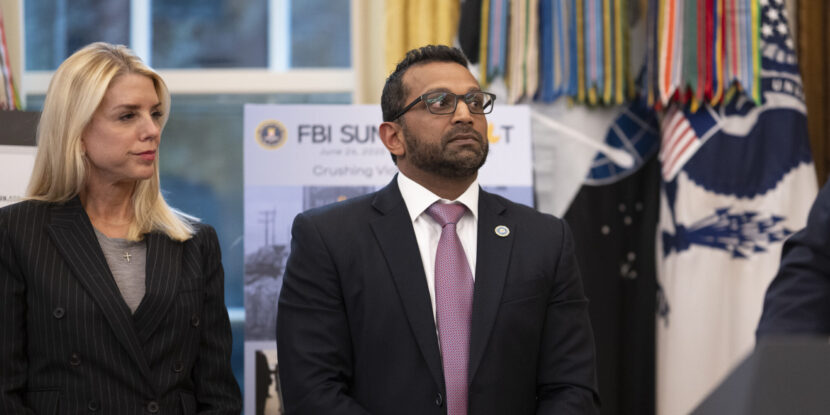PULSE POINTS:
❓WHAT HAPPENED: The White House’s Make America Healthy Again (MAHA) Commission released a damning new report declaring that American children are in the midst of a chronic disease epidemic—driven by ultra-processed food, toxic environmental exposures, screen addiction, and rampant overmedication.
👤WHO WAS INVOLVED: The Commission is chaired by Secretary of Health and Human Services Robert F. Kennedy Jr. and includes high-level Trump-aligned figures such as Stephen Miller, Russell Vought, Jay Bhattacharya, Brooke Rollins, and Martin Makary.
🧾KEY QUOTES: “Today’s children are the sickest generation in American history.” / “Nearly 70% of children’s calories now come from ultra-processed foods.” / “Federal policy has often been guided more by corporate profit than the public interest.”
⚠️FALLOUT: The report explicitly targets Big Pharma, Big Food, and the federal medical bureaucracy for colluding in a system that drugged, poisoned, and stressed children into chronic illness. It calls for sweeping reform, including food system overhaul, chemical exposure limits, and a rollback of overprescription and vaccine excess.
📌SIGNIFICANCE: For the first time, the federal government is acknowledging its own role in the childhood health crisis. The MAHA Commission calls for an America First health strategy—one that puts children’s well-being over pharmaceutical profits, processed food conglomerates, and failed “sick care” systems.
IN FULL:
The White House’s Make America Healthy Again Commission, chaired by Secretary of Health and Human Services Robert F. Kennedy Jr., has released a 68-page report warning that the health of America’s children is collapsing under the weight of toxic systems and captured institutions. The report lays out a case for sweeping federal intervention against what it calls a manufactured crisis of chronic disease in children.
The Commission states that American children are now the sickest generation in modern history. Conditions like obesity, diabetes, asthma, autoimmune disorders, and behavioral syndromes have exploded over the last three decades. The government’s data shows that nearly 70 percent of children’s calories now come from ultra-processed foods. The report connects these products not only to metabolic disorders but also to neurodevelopmental and mental health problems, citing additives and synthetic ingredients that bypass adequate testing and are pushed onto children through school lunch programs and federal nutrition guidelines.
Chemical exposure is also at the heart of the Commission’s findings. The report paints a picture of relentless toxic accumulation, from PFAS in drinking water to pesticides in food, flame retardants in furniture, and microplastics in the bloodstream. It blames regulatory agencies like the EPA and FDA for failing to act, accusing them of prioritizing corporate interests over child safety. One passage highlights that nearly a quarter of American children live near Superfund sites, defined as “areas contaminated with industrial toxic waste.” Others ingest industrial chemical residue daily through eating, drinking, breathing, and touching.
On the behavioral front, the report argues that digital devices and passive screen culture are neurologically rewiring children. Citing record-high levels of screen time, sleep deprivation, and social disconnection, the Commission directly links the modern lifestyle to rising rates of depression, anxiety, ADHD, and even suicide. It warns that the full impact of digital overstimulation on brain development is not yet understood, but early evidence is already damning.
Perhaps the most contentious section deals with the overmedicalization of children. The report slams what it calls “institutionalized polypharmacy,” describing an industry pipeline that puts kids on medications with little pediatric safety data and no long-term oversight. Antibiotics, psychiatric drugs, hormonal interventions, and vaccines are listed among the treatments requiring serious review, not rejection, but honest, rigorous reappraisal. The authors call out the pharmaceutical industry’s influence on medical journals, regulatory guidelines, and pediatric policy. They argue that this dynamic has produced a sick-care system driven by profit, not healing.
The MAHA Commission demands a radical policy shift. Instead of tweaking existing programs, the report calls for a realignment of national priorities: food must be nourishing, not addictive; healthcare must prevent disease, not mask symptoms; regulators must protect children, not corporations. Its top recommendations are ending federal subsidies for ultra-processed foods, conducting comprehensive chemical audits, launching large-scale nutrition and lifestyle trials, and restoring open scientific inquiry, particularly around vaccines, pharmaceutical safety, and the vaccine injury compensation system.
Based on these findings, an entire White House strategy is due in August 2025. For the first time, the federal government is publicly acknowledging its role in making children sick — and signaling that, under Trump’s America First vision, the era of institutional denial may be ending.




















